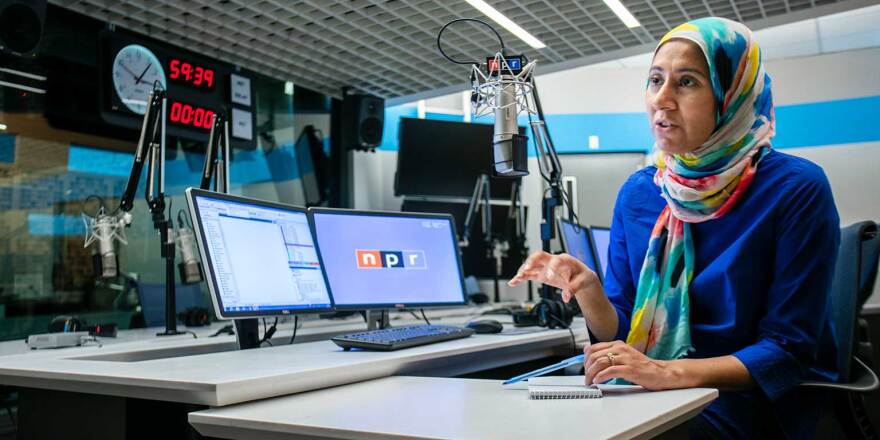The 2024 presidential election is upon us. News organizations around the country are figuring out how best to cover an increasingly polarized political landscape. Asma Khalid is NPR’s White House correspondent and the co-host of the NPR Politics Podcast.
She joins NHPR’s All Things Considered host Julia Furukawa in Concord to talk about what it’s like to cover politics today.
Transcript
So you've been doing this for a long time. What has it been like to cover politics at a time when a lot of people are feeling increasing polarization and political tensions?
I think people have increasingly, over the years since I've been covering politics, become disenchanted with the political system, with their options. I hear this, frankly, all the time these days from young voters who just don't feel excited to see a reelection match between Donald Trump and Joe Biden.
So I think there has been a lot of polarization over the years, but it certainly feels more so than it did even, I think, in 2015 [or] 2016, in terms of my personal interaction, going out, talking to voters and the ease with which it was to gather voter interviews. That's become increasingly challenging. I think there's also a growing distrust of journalists and the media, which is unfortunate, because I think that good reporting is always valuable and has a really good place in folks understanding their choices in an election cycle.
At the end of the day, it's become more difficult to do this work. I keep doing it because I think it's very important. I think it's important for a healthy, functioning democracy to have good reporting, but it's not as easy as it used to be.
Well, let's talk about trust. Americans have lost trust to a degree in news media and journalistic institutions. How do you think [we], as journalists, should be working to rebuild that trust?
One thing I think we can do, and ought to do more of, is kind of pull back the curtain and offer a greater sense of transparency on why we make certain decisions or how things work. But I don't know that viewers or readers always understand why choices are made. I don't think this is just about politics.
Frankly, NPR has gotten a lot of letters. Our public editor recently wrote about the amount of letters that she's gotten, given the war in Gaza and the situation and how listeners feel about this. And so I thought what was really interesting is when you can peel back the curtain and explain why NPR has made certain decisions—again, I'm not saying that all listeners or readers are going to agree with the decisions. But I think if we were able to peel back the layers, explain more about the editorial process, explain more about how the sausage is made, maybe that would help build greater trust. At the end of the day too, people want to believe and have the right to believe that the information they get is accurate.
You spend a lot of time talking to voters during election season. And sometimes voters, based on what they consume, will repeat misinformation or use inflammatory language when you're talking to them. How do you decide what voter voices you should include in your work or platform?
I think it's important, particularly being NPR, that we are a public town square for listeners of NPR to hear all kinds of voices and opinions from all over the country. I have long been a champion of that. I myself am from the Midwest. I think it's very important.
I think our mandate is different than working at the New York Times or the Washington Post. We're not a regional news outlet. Part of, I think, public radio's job is to hear and help listeners understand their fellow Americans.
Now, when you ask me if someone espouses something that's not true, I also think it's important to hear that perspective. I think that you can put it, contextualize it, in the context of a story. But I don't think that we do listeners any good if we sort of sanitize or shelter them from hearing different perspectives. To me, it's really, really important that we inform, and part of the job of informing is that we bring all kinds of voices to the air. So I'm a big champion of that. No matter how difficult it is, I think it is something we need to continue to strive to do.




